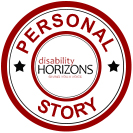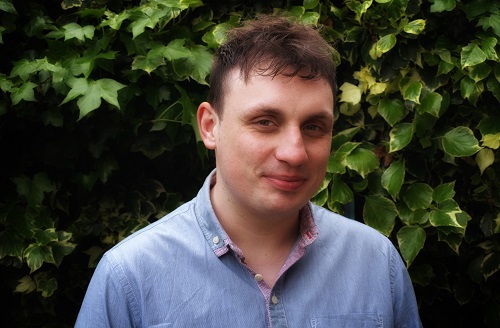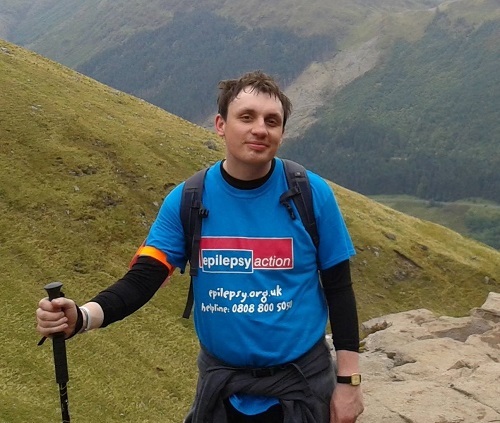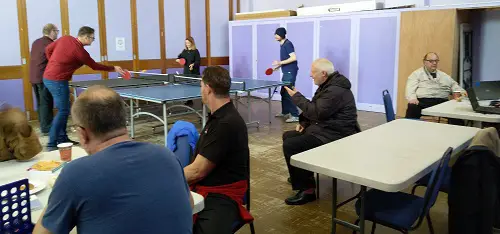
How one man found his passion and work through the Work and Health programme
Joe Stevenson is today a writer and disability campaigner living in Manchester. After Joe contracted epilepsy at the age of 17, things looked bleak.
He only found the courage to follow his passion for writing after a long journey through depression, fruitless job interviews, temporary data-entry work, discrimination and, finally, the right kind of support and encouragement from advisor Mike at the Work and Health programme.
Joe thinks that staying positive is important and that the Work and Health programme can help many more unemployed disabled people in the UK.
Stressed and depressed – Joe’s search for employment
 When I left university in 2012, I felt disabled, stressed and depressed. At that point, I was 23 and had scored well in BA Popular Musicology at the University of Salford. But I was also learning to live with epilepsy. Since then, I have spent more time looking for work than I have been working.
When I left university in 2012, I felt disabled, stressed and depressed. At that point, I was 23 and had scored well in BA Popular Musicology at the University of Salford. But I was also learning to live with epilepsy. Since then, I have spent more time looking for work than I have been working.
In time, I overcame depression and started offering information, advice and opinion about epilepsy and disability to others. And, as time has continued, I have gained a passion for fighting for the rights of disabled people.
Positive work experiences
Between 2015 and 2017, I spent two and a half years working temporarily as a data-entry processor after being hired by Reed Recruitment Agency to work for Lloyds Banking Group. Both of these companies are more open-minded than many other employers. For instance, they gave me extra time for some job-related tasks.
Aside from that, the best administration work experience I have gained was voluntary with a community interest company, Light of Hope CIC. The staff were always friendly and I enjoyed the employee benefits, such as reduced prices for their holistic therapy services, which helped me a lot when needed.
However, despite the positives, admin and data-entry wasn’t where I wanted to be – it wasn’t my passion and certainly didn’t leave me feeling fulfilled.

Employers’ negative attitudes towards epilepsy
It was when searching for work that I gained more insight into the difficulties of living with epilepsy.
Although my disability is reasonably well-controlled, most employers walked away whenever they heard about it in advance. As time continued, my expertise on the different barriers for disabled people broadened to include other conditions and impairments as well.
Trying to turn a passion for writing into a career
Ever since university ended, writing has always been a must-do activity for me. I tried writing blogs about my home city of Manchester and popular music, but fatigue made it hard to continue them.
However, after leaving Lloyds in June 2017, I knew writing an epilepsy and disability-related blog was my next step. I wrote and published more than 80 posts on my blog The Epileptic Man. It provided help to people of any gender or age.
While I loved the blog and believe it helped others, it didn’t give me an income. So, in July 2018, I was back on the dole receiving unemployment benefits. At that point, I was told about a service that provides support for disabled people searching for work.
The Work and Health programme for disabled people
The Work and Health programme provides individuals with one-to-one advice on a weekly basis. The branch I visited in Stretford, Greater Manchester, not only helps clients to find paid employment but also tries to tackle issues that are brought on by unemployment, such as isolation.
Ever since I became a client in 2018, Michael (Mike) Wright has been my advisor. Based on information about my health, life, skills and work experience, we discussed how barriers to employment could be tackled and opportunities created to get me a job.
Firm but fair, Mike made it clear that I needed to put more time and effort into getting an employer’s attention, with the ultimate goal of finding employment and coming off benefits.
Mike kept in touch with me over the phone. Before interviews, he made sure I was prepared and, afterwards, he showed an interest in how things went. He encouraged me and provided feedback, which I found very helpful.
Mike expected me to have work by October 2018. I got plenty of interviews, which showed employers were interested in me, but did not find a job until January 2019.

Experiencing disability discrimination
The job I found was sadly not the great experience or answer I hoped for. After a successful interview with a Payment Protection Insurance (PPI) company, where I managed to impress them, I was offered a permanent position.
The company claimed to be an equal opportunities employer. Along with others, I was hired to take on data-entry processing, but it was obvious I was not as quick as the other new employees. And, unlike at Lloyds, I did not get more time to memorise processes. In addition, the sudden increase in working 37.5 hours of work per week was very challenging too.
I told my boss that I needed more time t0 and requested a slightly shorter working hours schedule. My requests were immediately declined, and on 28 February 2019, I was sacked for being too slow after just three and a half weeks.
Although I felt that disability discrimination had taken place, I decided that trying to take the company to court was not worth the hassle.
From that point on, I knew I wanted to go about job searching differently and follow my passion for freelance writing.
Tackling isolation and building confidence
Since I decided to become an independent writer, Mike has created a new voluntary project within the Work and Health programme. The new social group of Stretford’s programme enables clients to talk with advisors whenever they wish. Additionally, group members can play table tennis, chess, cards and other games.
Social group meetings take place every other Tuesday, and around 20 clients from the programme regularly attend the social group. By starting these groups in other areas, other unemployed people could start gaining further benefits from the Work and Health Programme elsewhere as well.

I’m really pleased to see that it’s been useful for a number of disabled people. It is a valuable and effective addition to the programme.
Mike told me: “With a number of our customers initially being far away from the job market and also quite socially isolated, it was important to set something up to help people tackle social isolation and also build on people’s confidence.”
Although for me, the Work and Health programme did not result in a permanent job, Mike and the programme helped me to take the step to become an independent writer. And, without the programme, I would never have befriended Mike.
I believe that more people across the UK could benefit from the services of the Work and Health programme. After living with depression in early adulthood, I know that removing isolation is important to maintain happiness.
Today, I am not only an independent writer but a disability campaigner and member of the Greater Manchester Coalition of Disabled People too. I know confidence can often be lost with a lack of positivity, but, right now, we need as many confident disabled people as possible to help us fight for our rights in the UK and abroad.
I hope my story and my experiences with the Work and Health programme help others to find their own way.
By Joe Stevenson
Find out more about Joe and his work by visiting his website, www.joestevenson.net and following him on Twitter @TheJoeStevenson.
More information about the Work and Health programme can be found on the government website.
More on Disability Horizons…
- Top critically-acclaimed disabled artists and writers
- Finding a voice and an outlet through mouth painting
- Using writing as a way to free yourself and increase disability awareness
Originally posted on 25/09/2019 @ 2:27 pm